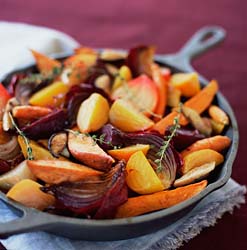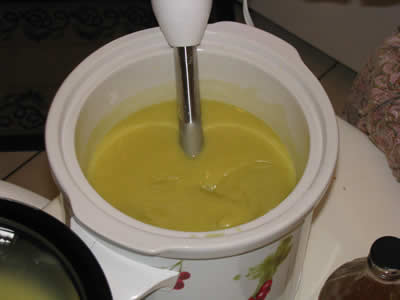Living with PCOS: Why nutrition really matters
If you've missed the first posts in this series, you can read them here: The beginning of my story and then Taking a step back.

When I was first diagnosed with PCOS, I was lightyears from the place of health and nutrition consciousness that I am now. In fact, it was my diagnosis that spurred me on to learning and beginning to adapt my lifestyle. There's nothing like a serious diagnosis to wake you up a bit to the reality of where your body is at and how you should be taking care of it.
The first steps for me were to learn about nutrition. Quite honestly, I knew nothing and I look back on it now and wonder how I could not have known any more than I did. It's a tragedy that children and teens these days are being taught next to nothing about true nutrition or what it takes to care for a healthy body. I'm not exaggerating in the slightest to say that I didn't actually know that my body required certain amounts of different nutrients to function well, that it needed minimum amounts of fiber and water, or that sugar was actually harmful in a way that went beyond giving me cavities.
I think that step one in proactively dealing with PCOS is recognizing that what we eat plays a huge role in minimizing this disorder and it's effects on our body
1) Too little of a particular nutrient can prevent an aspect of our hormonal system from functioning optimally.
Lack of specific nutrients greatly impairs our endocrine (hormonal) system from working the way it is supposed to- these important nutrients include B vitamins (especially B6 and B12), essential fatty acids, Vitamin E, Vitamin A, iron, magnesium, selenium, zinc and a myriad of others. When our nutrition is lacking, our endocrine system stops working smoothly as it was created to. Hormones are delicate little things, and even slight imbalances can make a large difference. Simply put, hormones are messengers in our body that tell it what to do and when, and when there are too many or not enough of a particular messenger, our body's systems and organs do not work together as they should.
2) What we eat impacts our blood sugar and insulin levels.
This is particularly important for those with PCOS, because over and over again researchers are noting a strong insulin connection to this disorder. This is a major contributing factor for those who struggle greatly with maintaining a healthy weight. Their bodies cannot regulate a correct blood sugar level, and as a result, they often store their calories as fat. It should also be noted the insulin is, in fact, a hormone, and as I said before, slight imbalances make big differences. When high or erratic blood sugar levels push your insulin out of whack, there is a domino effect with your other hormones.
3) Some foods can either seriously aggravate or benefit a hormonal condition.
Soy has long been promoted as a revolutionary health food, a panacea of sorts. It has even been recommended for those with hormonal imbalance, because it mimics estrogen in our bodies (referred to as a phytoestrogen). It's presence actually confuses our body into thinking that more estrogen is present than there actually is, and this again leads to a domino effect. Aside from the fact that soy is not a wise choice nutritionally speaking, this estrogenic effect in our bodies is a very negative thing for most women, as estrogen dominance is extrememly common these days and contributes to many conditions.
On the other end of the spectrum, foods in the cruciferous family (such as broccoli and cauliflower and cabbage), can actually help to reduce excess estrogen in the body because of a nutrient they contain called indole-3-carbinol. For many women with an excess of estrogen, this can be a huge benefit! So you can see how particular foods can both help and hinder our bodies (this is not to cause you anxiety as you wonder which foods to eat or avoid, but only to help you see the effects that food can really have, and I will make more specific suggestions later on).
4) A smoothly running system is more likely to be in balance.
Several years ago, I went to an excellent seminar put on by a woman (either a nutritionist or naturopath- I can't remember), who gave a 9 point system for regaining hormonal balance. I was surprised to hear her include fiber and water as 2 of her 9 points, as she made an impressive case for the positive effects that good elimination (ie. bowels that work well and consistently) and a well hydrated system have on hormonal balance. This attests to the fact that the overall picture of what and how we eat can make a real difference in our health.
5) Carrying excess weight has negative effects on our hormones.
I think it is pretty well accepted that how we eat affects our weight. Being overweight has a huge chain of negative impacts for our health, such as increasing your risk for diabetes, high blood pressure or heart problems, exacerbating joint problems like arthritis, and definitely impacting our hormonal balance and reproductive systems. For example, did you know that women with anorexia often lose their menstrual cycle because they have too little body fat? Did you know that those who are overweight often have excessively high estrogen levels because estrogen is stored in fat cells?
These are just a few of the reasons why nutrition matters when it comes to living with PCOS.
My goal for this week is to set the stage for discussing some of the changes that I have made in my life since my diagnosis. Some of them may seem simplistic in many ways, and some are a bit more complex. My passion for nutrition has developed over the years, because I have experienced the rewards that better nutrition brings. It works. It will make a difference.
For those of us who have spent our lives esteeming the medical community, and doing whatever we were told by doctors, it can be difficult to shift gears and believe that something like nutrition can impact our health so greatly. Perhaps even more difficult to believe that things like nutrition and our overall lifestyle can benefit a diagnosis like PCOS, getting to some of it's root issues, far more effectively than any pill ever could. Suspend your disbelief. Go there with me, and walk with me as I share about the road to health that I have been traveling.



I can’t wait to read the rest! Very interesting. I do have a question. Do you have any info on natural remedies or change in diet that would help severe ecxema? My husband has a case of what is called (don’t know if I’m spelling correctly) Ehydrotic Ecxema. It’s only on his hands and feet and it looks terrible and causes him a lot of pain. His fingers are constantly dry, cracking, peeling and bleeding and the tops of his feet do the same thing. Any suggestions? I plan on looking it up myself too but anything info you can give me on natural remedies would be great. So far they have him on a steroid cream that he has to use for a little bit then go off of then use then go off of etc. It helps him when he’ son it and then when he goes off it the ecxema comes back in a rush again. Thanks in advance for any words of wisdom :o)
p.s And I now realize Eczema is spelled with a Z not an X! sorry!! LOL
I really am finding this so interesting. Thanks for sharing it!
I had to comment about children and teens not being educated about nutrition. The doctors aren’t either. I have a cousin who is one year from completing her residency. In undergrad and med school she had exactly one class in nutrition! Outrageous! Doctors are taught to diagnose and push meds!
You mentioned 2 of the 9 point system for regaining hormonal balance–Fiber and water. Can you give us the rest of them? It is so interesting. Drinking water makes everything feel better. You do a great job as wife and mother.
Blessings
Please don’t stop posting about PCOS.
You are my new favorite blogger. THANK YOU! I have struggled with this for so long! I think I actually gave myself PCOS when I was 21 and decided to become a vegetarian (I’m almost 29 – AH!!). How nicely you put the soy thing. Did you know that the asian world mostly only uses soy as a CONDIMENT!? Not as a major factor in their diet… Funny. Anyway, I discovered that I had PCOS just three months after marrying my husband. It was heartbreaking and the nurse just left me at, “Well, you have PCOS, you might not ever have babies. See ya.” It was AWFUL! I did conceive with the help of Clomid and my beautiful baby boy is 2 1/2. I did get Gestational Diabetes (along with a slew of other things) when I was pregnant… of course. And I am still struggling with my insulin, hairy, pimply issues. BARF! Again, thank you for your posts. I can’t wait for the rest of them!
Kellie
Thanks for the great information. I am living with PCOS and finding out how to balance myself in a natural and organic way. Arming myself with information and taking back control from the pill-pushing doctors is so uplifting and re-energizing!
Please keep posting!
Peace, happiness + blessings